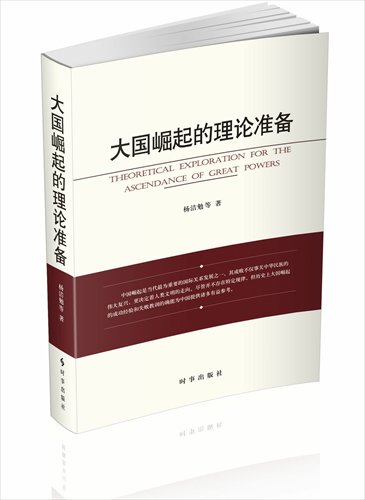HOME >> OP-ED
Ascending powers need moral responsibility as well as economic strength
Source:Global Times Published: 2014-11-20 18:28:01

Yang Jiemian, Theoretical Exploration for the Ascendance of Great Powers, Current Affairs Press, October 2014
The ascendance of emerging powers is the most important part of international relations in the 21st century, which will definitely reshape the international pattern and impact the traditional powers. Hence, properly coordinating interests between emerging powers and traditional powers has become an important task for rising powers, especially China.History shows that the ascendance of new powers is always accompanied by conflicts and even wars. Although there's no specific law of the rise and fall of powers, experiences of successes and failures can still suggest useful lessons to China.
Yang Jiemian, senior fellow at Shanghai Institutes for International Studies and counselor of the Shanghai Municipal People's Government, and his colleagues analyze these lessons and compile them into their newly published book Theoretical Exploration for the Ascendance of Great Powers.
The book divides the ascendance of previously great powers into four aspects: economic ascendance, moral ascendance, military ascendance and institutional ascendance. These four kinds of ascendance have not occurred simultaneously during the ascendance of great powers; instead, they are sequential.
For all countries, the basic condition for their ascendance is the improving of the national strength, especially the economic strength. However, economic ascendance itself cannot maintain the comprehensive ascendance of a great power. The moral ascendance is required to provide support so as to transform economic ascendance to strategic influence.
Currently, China has already achieved results in economic ascendance. However, suspicions and even boycotts from the US and China's neighboring countries have appeared when Beijing attempts to expand the fruits from economic area to security and strategic areas. Neighboring countries' worries and the competition between China and the US explain the present-day dual structure of the Asia-Pacific region, in which the US dominates security affairs while China's economic power grows.
The root of this situation is that China has not proposed a powerful discourse which "touches the human soul and meanwhile fits the global trends," as the book says. That is to say, China's economic ascendance lacks moral support.
China pursues peaceful ascendance, but for now, the book believes that all attempts at building institutions, which can maintain Chinese sustainable development, will be suspect. In such a case, China's efforts in global institutional building should also take the moral support of national ascendance into consideration. "Only by gaining support morally can the 'Chinese exceptionalism' of its military ascendance be reasonable," the book argues.
Moral ascendance requires China to have more discourse in international relations. Currently, all theories of the rising of traditional powers are based on the exclusiveness of one country. Against such a backdrop, the book holds that China's proposal of the new type of major power relationship is a good attempt to change the outdated mind-set dominated by the traditional powers and reshape international discourse.
In the new type of major power relationship, powers not only include the big countries in traditional sense, but also include hegemonic powers as well as major developing powers represented by the BRICS countries. This meets the general trends of global internationalization and the democratization of the international relations.
The book speaks highly of the importance of the new type of major power relationship, saying that it "provides a non-material perspective for the world to understand the material relationship in the world."
The book believes that taking the opportunity of building the new type of major power relationship, coexistence and a win-win situation of powers, both emerging ones and traditional ones, can be achieved through peaceful means for the first time in the history of human civilization.
Posted in: Fresh off the Shelf, Viewpoint